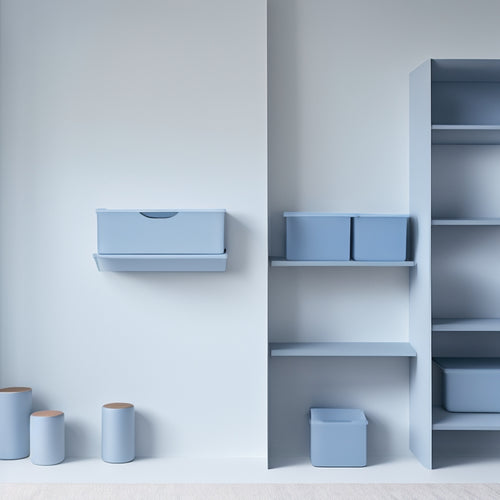
Why Digital Decluttering Feels So Overwhelming Initially
Share
You're not alone in feeling overwhelmed by digital decluttering. It's likely because you're staring down a massive amount of accumulated data, and the thought of managing it is anxiety-inducing. Perhaps you're afraid to delete important files or struggle with organizing your digital life. Insufficient storage space and emotional attachment to memories can also contribute to the feeling of being stuck. The key is to break it down into smaller, manageable tasks. Identify the areas that need attention and start with small steps. As you make progress, you'll uncover strategies to help you tackle the digital clutter and regain control of your digital life.
Key Takeaways
• The sheer amount of accumulated digital data can be overwhelming, leading to anxiety and frustration.
• Fear of deleting important files or losing essential information can cause procrastination and digital hoarding.
• Lack of organizational skills and unclear goals can make digital decluttering feel like a daunting task.
• Inadequate digital storage space and insufficient data management habits can exacerbate feelings of digital overwhelm.
• Emotional attachment to digital files and memories can make it difficult to let go, leading to nostalgia overload and memory hoarding.
Overabundance of Digital Data
Since you started using digital devices and social media, you've accumulated a staggering amount of digital data, from emails and documents to photos and videos, which can be overwhelming to manage. This digital hoarding can lead to feelings of anxiety and frustration, making it difficult to find what you need when you need it.
It's time to take control of your digital life and adopt a more mindful approach to data management. Start by recognizing that digital clutter isn't just about having too much data, but also about the emotional attachment we've to it. Information organization is key to breaking free from digital hoarding.
Begin by categorizing your files, creating clear folders, and setting up a system for regular backups. Embracing digital minimalism will help you focus on what's truly important and let go of the rest. By implementing these strategies, you'll be able to free up space, reduce stress, and regain control over your digital life.
Fear of Deleting Important Files
Fear of losing essential information holds you back from tackling digital clutter, as the thought of deleting an important file or photo by mistake is a challenging prospect. You're not alone in this fear, and it's understandable to feel anxious about losing valuable data. However, there are ways to alleviate this fear and confidently declutter your digital space.
Here are some strategies to help you feel more secure:
-
Explore file recovery options: Familiarize yourself with file recovery software and services that can help you retrieve deleted files in case of an emergency.
-
Implement backup strategies: Set up automatic backups of your important files to an external hard drive, cloud storage, or both. This way, you'll have a safety net in case you accidentally delete something essential.
-
Create a 'maybe' folder: When decluttering, move uncertain files to a 'maybe' folder and set a deadline to review them. If you haven't opened or needed them by that time, it's likely safe to delete them.
- Take small steps: Start with small areas of your digital space, like cleaning out a single folder or deleting unused apps. This will help you build confidence in your digital decluttering skills.
Lack of Organizational Skills
You're likely to feel overwhelmed by digital clutter if you're unsure how to organize your files, emails, or computer desktop in a way that makes sense to you. This lack of organizational skills can lead to procrastination habits, causing you to put off digital decluttering tasks indefinitely. As a result, you'll continue to waste time searching for misplaced files or scrolling through a crowded inbox.
To break this cycle, establishing a system that works for you is crucial. Start by identifying your priorities and categorizing your files accordingly. Create folders, labels, and filters that make sense to your workflow.
Here's a simple framework to get you started:
| Category | Subcategory | Action |
| Files | Work Projects | Create folders by project name |
| Emails | Unread Messages | Set up filters by sender or topic |
| Desktop | Frequently Used Apps | Organize icons by frequency of use |
Inadequate Digital Storage Space
You're probably no stranger to the frustration of running out of room on your devices or in the cloud. As you've accumulated files, photos, and documents over time, your storage space has become constrained, making it difficult to find what you need when you need it.
It's time to confront the reality of your digital storage situation and take control of your digital clutter.
Running Out of Room
How often do you find yourself struggling to free up space on your devices, wondering where all those gigabytes went? It's frustrating, especially when you need to store important files or install new apps. Running out of room is a common problem in today's digital age, but it's not impossible to tackle.
To take control of your storage space, start by evaluating your data management habits. Ask yourself:
- What kind of files are taking up the most space on your devices?
- Can you delete or compress any unnecessary files?
- Are there any duplicate files or versions that you can merge or remove?
- Can you consider storing some files in the cloud or on an external hard drive?
Storage Space Constraints
As you begin to address your data management habits, it becomes evident that insufficient digital storage capacity is often the root of the problem, compelling you to make tough decisions about what to keep and what to delete. You may feel overwhelmed by a flood of digital clutter, and determining where to begin can be challenging. This is particularly true if you've succumbed to digital hoarding, retaining files and data 'just in case' you may require them in the future.
To break free from this cycle, focusing on space management is crucial. Start by pinpointing areas where you can consolidate your data, such as combining duplicate files or removing unnecessary documents.
Consider investing in storage solutions like cloud storage or external hard drives to create more space on your devices. By optimizing your digital storage, you'll be able to breathe a sigh of relief and regain command over your data.
Keep in mind, digital decluttering is a gradual process, and it's acceptable to take it one step at a time. By addressing your storage space limitations, you'll be on the right track to a more organized, stress-free digital life.
Difficulty Letting Go of Memories
Memories attached to digital files can be particularly tough to part with, making it hard for you to delete that video of your child's first birthday or the voicemail from a loved one who's no longer with you. You're not alone in this struggle. Sentimental attachments and emotional attachments can make digital decluttering feel like an insurmountable task.
Here are some reasons why letting go of memories is so difficult:
-
Nostalgia overload: You're flooded with memories every time you scroll through your digital files, making it hard to decide what to keep and what to delete.
-
Memory hoarding: You're afraid that if you delete a file, you'll forget the memory or lose the emotions associated with it.
-
Fear of loss: You're worried that deleting a file will erase a part of your past or a loved one's memory.
- Uncertainty about the future: You're unsure if you'll need the file again in the future, so you hold onto it 'just in case.'
Unclear Digital Decluttering Goals
When you start digital decluttering, you might feel overwhelmed because you're not entirely sure what you want to achieve.
You haven't defined what a 'clutter-free digital life' means to you, or what specific areas of your digital space you want to focus on.
As a result, you're struggling to set clear objectives, which makes it tough to create boundaries around your digital habits and behaviors.
Lack of Clear Objectives
You're likely to feel stuck in digital decluttering limbo if you haven't defined what you want to achieve, leaving you wondering where to start and how to measure progress. Without clear objectives, you'll struggle to prioritize tasks, allocate time, and allocate resources. This uncertainty can lead to procrastination, frustration, and a sense of overwhelm.
To overcome this hurdle, take a step back and reflect on what you want to achieve through digital decluttering. Ask yourself:
-
What're my top priorities for digital decluttering? (e.g., freeing up storage space, reducing distractions, or improving online security)
-
What distractions do I need to clear to create focus and establish direction?
-
What specific areas of my digital life do I want to declutter (e.g., email inbox, social media, or computer files)?
- What benefits do I hope to gain from digital decluttering (e.g., increased productivity, reduced stress, or improved work-life balance)?
Undefined Digital Boundaries
Having clear objectives is just the first step; now, it's time to define the boundaries of your digital decluttering project by setting specific, measurable goals that will guide your efforts and help you stay focused.
You need to determine what you want to achieve and how you'll get there. Without clear boundaries, you'll feel lost and overwhelmed. Start by identifying what areas of your digital life need the most attention. Is it your social media feeds, email inbox, or computer files?
Once you've pinpointed the areas, set specific goals for each one. For instance, you might aim to reduce your social media usage by 30 minutes a day or delete 50% of your unused apps. By setting these boundaries, you'll be able to measure your progress and stay motivated.
Information Overload Online
Online, you're constantly bombarded with notifications, updates, and endless streams of information, making it difficult to discern what's truly important and what's just digital noise. It's no wonder you feel overwhelmed and anxious, struggling to stay focused and make sense of it all.
This information overload can lead to a sense of digital fatigue, making it hard to disconnect and relax.
Here are a few strategies to help you regain control:
-
Set boundaries by limiting your screen time and taking regular breaks from social media and email.
-
Practice mindful browsing by being intentional about the websites and content you consume.
-
Consider a digital detox to clear your mind and gain mental clarity.
- Use tools and apps that help you filter out unnecessary information and prioritize what's truly important to you.
Inefficient Digital Filing Systems
Cluttered computer files and disorganized digital documents can leave you feeling frustrated and disoriented, making it difficult to find what you need when you need it. This digital clutter can lead to anxiety, causing you to feel overwhelmed and stuck.
You're not alone - many people struggle with digital hoarding, unsure of how to manage their files and documents. The truth is, inefficient digital filing systems can be a major obstacle to digital decluttering.
Take a deep breath and know that it's never too late to create a system that works for you. Start by categorizing your files into clear folders and subfolders. Be ruthless - get rid of any duplicates or unnecessary documents. Consider color-coding or using tags to make your files easily searchable.
The goal is to create a system that's intuitive and easy to navigate, so you can find what you need in seconds. By streamlining your digital files, you'll reduce frustration and anxiety, freeing up mental energy to focus on what matters most.
Take control of your digital space and start decluttering today!
Unfamiliarity With Cloud Storage
You've tackled your computer files, but now it's time to explore the vast possibilities of cloud storage, which can be intimidating if you're not familiar with it, leaving you wondering where to start. Don't worry, it's normal to feel overwhelmed. Cloud storage can be a game-changer for your digital decluttering journey, but understanding its benefits and addressing your data security concerns is crucial.
Here are some key points to bear in mind:
-
Cloud storage benefits: Cloud storage provides easy access to your files from anywhere, automatic backups, and scalability. It's a fantastic way to free up space on your devices and reduce digital clutter.
-
Data security concerns: When choosing a cloud storage provider, make sure it has robust security measures in place, such as end-to-end encryption, two-factor authentication, and regular security audits.
-
Start small: Begin by transferring a small batch of files to the cloud and gradually move more as you become comfortable with the process.
- Take advantage of tutorials and support: Most cloud storage providers offer tutorials, guides, and customer support to help you get started and address any concerns you may have.
Feeling Overwhelmed by Notifications
Digital noise can be deafening, and the constant barrage of notifications from your devices can be a significant source of stress and anxiety in your digital decluttering journey. It's no surprise you're feeling overwhelmed, trapped in a cycle of notification fatigue. You're not alone in this struggle.
| Notification Type | Boundary to Establish | Benefit |
|---|---|---|
| Social Media | Restrict checks to 3 times a day | Reduced mental clutter |
| Allocate specific times to check | Increased productivity | |
| App Updates | Turn off unnecessary updates | Reduced distractions |
| Text Messages | Assign 'no notification' periods | Improved focus |
To break free from this cycle, setting boundaries with your devices is crucial. Mindful disconnection is the solution. By being deliberate about when and how you engage with your devices, you can decrease the mental clutter and make room for what truly matters. Begin by identifying the notifications that sap your energy and establishing boundaries to minimize their influence. Remember, each small step towards digital decluttering is a step towards a more serene, organized you.
Frequently Asked Questions
How Do I Prioritize Which Digital Files to Declutter First?
You start by identifying your most time-sensitive files, then categorize and prioritize them based on urgency and importance, using effective file organization strategies to guarantee a smooth and stress-free decluttering process.
Can I Declutter Digital Files on My Phone as Well?
You can definitely declutter digital files on your phone! Start by organizing your data into clear categories, then tackle storage management by deleting unnecessary apps, photos, and videos, freeing up space and reducing digital clutter.
What Are Some Digital Decluttering Tools I Can Use for Free?
"Ah, the sweet taste of digital freedom! You're one step closer to a clutter-free digital life. For a minimalist digital organization, you can use free tools like Google Drive, Trello, or Evernote to declutter and organize your digital files, following simple digital decluttering tips and tricks."
How Often Should I Perform Digital Decluttering Tasks?
You should perform digital decluttering tasks regularly, ideally weekly or bi-weekly, to maintain organization and productivity. This frequency helps you stay on top of clutter, enjoy benefits like reduced stress, and develop effective decluttering strategies.
Is It Necessary to Have a Backup Before Digital Decluttering?
As you start on digital decluttering, imagine a safety net: having a backup is vital, protecting you from the nightmare of data loss, ensuring your precious files are secure, and giving you peace of mind to tackle the task with confidence.
Related Posts
-

Small Storage Bins to Maximize Shelf Space
When maximizing shelf space, you want to make the most of every inch. Small storage bins are the answer, but choosing...
-

10 Best Tool Boxes for Every Budget and Job
You're looking for a tool box that fits your budget and job requirements. Whether you're a DIY enthusiast, electricia...
-

Best Cheap Tool Boxes for Budget-Conscious Buyers
You need a reliable tool box that gets the job done without breaking the bank. Look for durable materials, rust-resis...


